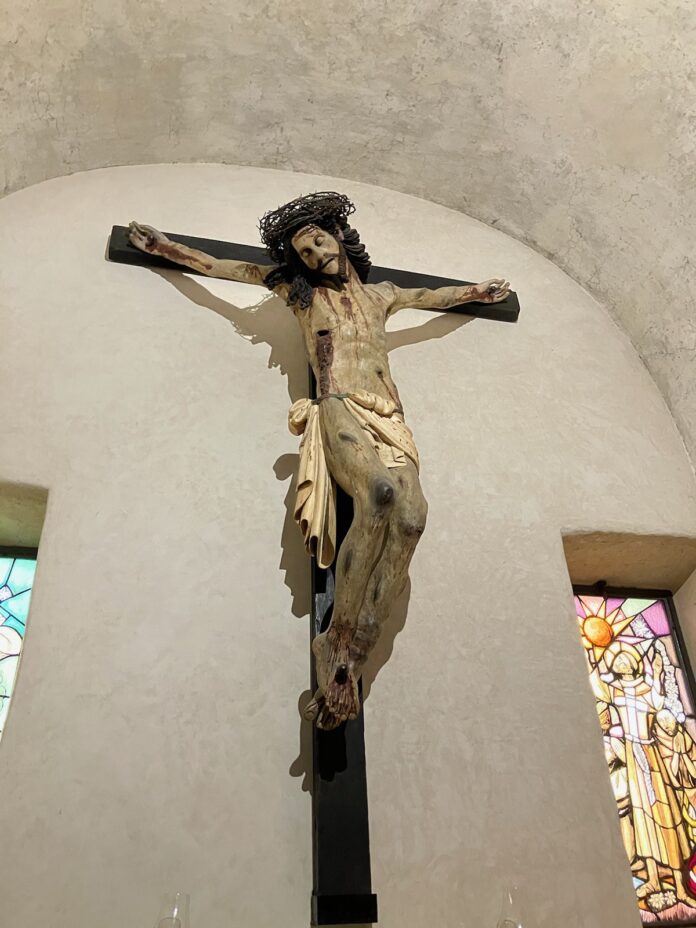
The meaning of the Incarnation
Disclaimer:
All articles published within this section of The Cor Chronicle are the opinions of the respective authors and do not necessarily reflect the opinions of The Cor Chronicle.
In this valley of tears, every single one of us struggles with sin. Yet in 2 Corinthians 12:9 Christ says the following in response: “My grace is sufficient for you, for power is made perfect in weakness.”
What a strange statement, what a strange notion, and what a strange paradox. How can it be that power is made perfect in weakness? The notion doesn’t seem to make sense. Yet, this forms the very foundation of the Christian faith, which is centered on the Resurrection – the very proof that power is made perfect in weakness.
In order for the Resurrection to happen, Christ had to die. But Christ could not die if He was not man, for death is a human experience, a consequence of original sin. How Christ became man is present in the mystery of the Incarnation: God the Son became Man in the Person of Jesus Christ.
The Incarnation is the ultimate example of how power is perfected in weakness, for God, while remaining fully God, chose to live as a human being and undergo every single experience that every human has, except for sin. One key aspect of our human condition is found in our own limitations. Yet in His Sacred Humanity, though fully divine, our Lord lived with the limitations that we have.
What does it mean that Jesus Christ experienced every human weakness without sin, while remaining God? It means that the dignity of human beings has been lifted up, for God became Man, lived as a human being and suffered and died a most horrendous death on a Cross. But just as Christ rose from the dead, so too did He raise the dignity of man and save man from sin and death.
The life of Christ from His Incarnation to His passion, death, resurrection and ascension is the template for how power is made perfect in weakness. This template can be seen in particular through Christ’s baptism. People came to John the Baptist to be baptized as a symbolic power for the forgiveness of sins. By being baptized, Christ placed Himself in solidarity with the entire sinful human race. It was at Christ’s Baptism–a moment of lowering Himself–that He was recognized by God the Father as His Son, ushering in His public ministry, doing something greater than John the Baptist. In Mark 1:8, where John the Baptist baptizes with water, “[Christ] will baptize you with the holy Spirit”–meaning that Christ elevates Baptism as a sacrament that is efficacious in the forgiveness of sins.
As St. Paul describes in Philippians 2, “Though [Christ] was in the form of God, did not regard equality with God something to be grasped. Rather, he emptied himself, taking the form of a slave, coming in human likeness; and found human in appearance, he humbled himself, becoming obedient to death, even death on a cross. Because of this, God greatly exalted him and bestowed on him the name that is above every name.”
Christ’s Incarnation meant that he grasped the form of a “slave” as St. Paul described above. By taking on the form of a slave, made man his “friend,” meaning one lives according to the commandments of Christ and living away from sin (John 15:14-15).
Overall, what Christ commands is that we live like He does, in a manner that follows His example of power being made perfect in weakness. We must lower ourselves just as He did.
The way to start lowering ourselves is to trust in God and believe that even though we sin, God will turn our weaknesses into strengths. Practicing trust in God can be done in many different ways. As a student or someone in the working world, it means faith–taking time to pray and remembering that our work is not what matters most in life. As someone with family and friends, it means practicing charity– to will the good of the other–even when it is extremely hard. Ultimately, as someone in this valley of tears, it means holding onto hope even as the storms of life hurl around you. If Christ is truly the God-Man, then what are we afraid of? He is our hope.
